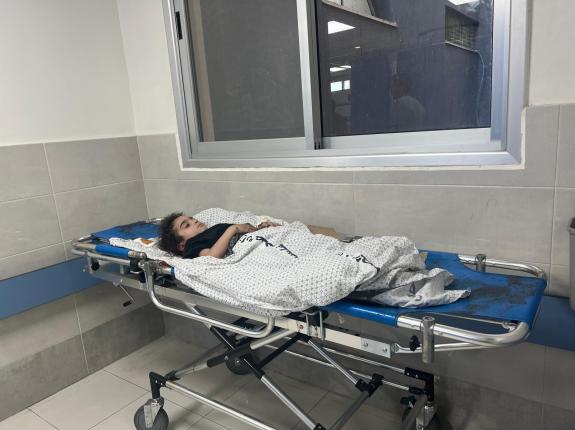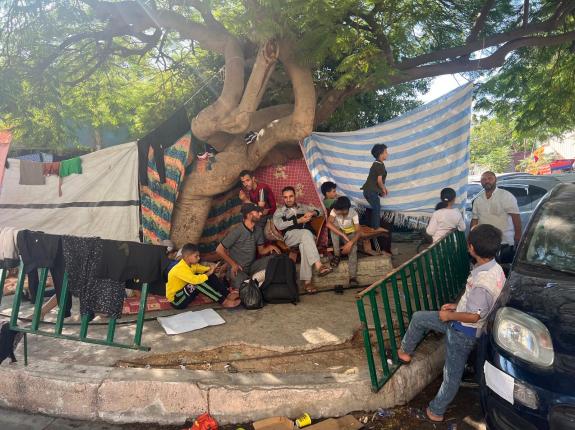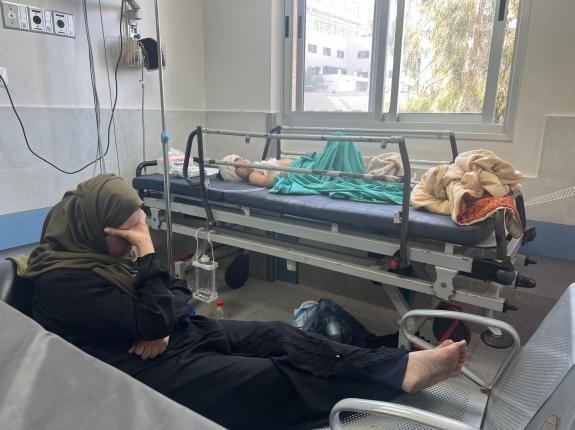"The entire area transformed into a volcanic landscape as the army's rockets pounded the ground, turning it upside down. We prayed desperately to survive until dawn, to not be buried under the rubble."
13 October 2023. It was 4:30 a.m., and I found myself awake again. I was able to gain just one hour of sleep that night amidst the relentless sound of bombings. The explosions rocked the ground beneath our feet, shaking the house to the point where I feared the cement might collapse, swallowing us alive. We huddled together, sleeping on mattresses in the corridor near the door, ready to escape if we were lucky enough to make it out.
As I awoke, I instinctively reached for my phone, which is usually kept on silent to mute the barrage of news notifications. I saw over 15 missed calls from my colleagues who were trying to reach me to urge me and the others to leave our homes in Gaza City before sunrise. The Israeli army had ordered us to evacuate the northern part of the Strip.
I took a deep breath, my mind racing. "Where do we go in the South?" I wondered. We had never evacuated an entire governorate before, especially to a place where we had no relatives. My siblings and mother refused to leave, insisting that this was just another war, which we were used to. Why abandon our home? We had no idea that in a few days, we would be forced to escape death.
At 11:30 a.m., leaflets began falling from the sky, dancing in the air before we caught them. "Do not return before prior notice from the Israeli army" they warned. My manager called, his voice was serious. "We have to leave; this is not a joke!" His words infuriated me. "You can't teach people under fire how to protect themselves or tell us what's a joke!" I snapped, even though he was a kind colleague, who often brought us dessert when he returned from Jerusalem.
We ouldn’t go back to my office to take a car and we didn't find any taxis. It was very difficult to evacuate. An Israeli strike had killed people while they were evacuating, we said it was good we didn’t leave yet.
We moved to Nuseirat refugee camp for a few days, staying with friends who generously took us in. The house was overcrowded, with insufficient water and poor hygiene, so we decided to return home to Gaza City. It was terrifying—the area was deserted. That night, we chose to sleep at the Orthodox Cultural Center, hoping it would be safe, as many families had taken shelter there.
Almost all our neighbours had already evacuated, leaving just a few families behind. It felt like the only refuge we had.
But it was a night from hell. The entire area transformed into a volcanic landscape as the army's rockets pounded the ground, turning it upside down. We prayed desperately to survive until dawn, to not be buried under the rubble.
At 7:00 a.m., the bombing finally subsided, and we ventured outside. Our building, our neighbourhood—it all lay in ruins, blackened and deserted, with heavy smoke hanging in the air.
"I want to go back," I thought. "I need my helmet, flake jacket, my clothes, my tablet, so many things." But there was no chance. We had to leave, forced to follow the instructions that had uprooted our lives.
Two days later, the Orthodox shelter was evacuated and hit overnight, turning the luxury cultural centre that took years to build into rubble.
We moved to a house in Deir Al-Balah, but the fourth floor and the roof were targeted. Miraculously, we survived, but our kind neighbours were killed, and many others were injured, though some survived like us. With no transportation available, we used a donkey cart to search for a new shelter in Khan Younis, just a few weeks before the Israeli military’s operation there started.
My good manager called again and said, “There’s no place to go other than the deconflicted area we secured, like many other organizations.” He generously coordinated a car to take us to a location in West Khan Younis. However, that place was also overcrowded. Fortunately, we managed to rent a house in Rafah, but soon afterwards, the Israeli army announced an operation there.
"Where do we flee to now?" I wondered. I tried everything to get a tent from UNRWA or to find one to buy, but I couldn’t. If they attacked Rafah, there would be no houses to rent, no place to go, not even a tent to cover us at night. Like many Gazans, we used our savings and the money we raised from the help of friends to leave Gaza before the war escalated further.
Back in Gaza, I had a cherished routine that brought me immense joy. For the past three years, I frequented the 11th-floor Oxygen Gym in the western part of Gaza City. From the large windows, I enjoyed a breathtaking view of the sea and breathed in the fresh, salty air. Each day, I embarked on a journey of self-improvement, starting with lifting weights followed by cardio sessions. My goal was to build muscles and stay fit, driven by comments I received at work about not being strong enough to handle an armoured vehicle door or open a tightly sealed bottle of water. Going to the gym was my daily routine until the weekends, when I would rest my muscles. Then, on October 7th, everything changed. Little did I know, the strength I was building would become crucial when we were displaced during this war.
When we fled our home, destroyed without warning, I had to carry my sister’s heavy bag that she couldn’t take. These same muscles also helped me carry 15-liter water gallons from street vendors, our only source of water for cleaning and drinking. It was a tough experience, but the strength I built proved invaluable.
At the time that I was building my muscles, others were planning for the attack, and some were using drones to locate the coming targets. It is not easy to be a civilian with a normal life in Gaza.
Sure, finding protein supplements was a bit of a challenge, especially with the limited job opportunities and high prices in Gaza. But that didn't deter me! Like many fitness enthusiasts, I found a creative solution. We relied on the UNRWA sardines distributed and sold at affordable prices on the black market. During the war, it felt like a little victory every time we got hold of them. In this war, finding food was a great victory!
Last April, I arrived in Doha, a city in Qatar that has generously received hundreds of Palestinians.
The desert sunset is enchanting, a beautiful sight that fills us with joy. However, nothing can quite compare to the stunning sunsets over Gaza’s Sea, which we cherished so deeply. The sunsets were so precious to us and enjoying them always came with the fear that we would lose them. Joyful moments never seem to last in Gaza, a city which witnesses an escalation at least once each year and a war every few years.
Our love for the breathtaking Gaza sunsets ran so deep that we felt we could lose ourselves in their beauty.



